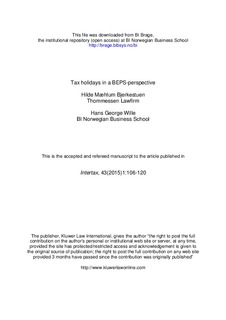| dc.contributor.author | Bjerkestuen, Hilde Mæhlum | |
| dc.contributor.author | Wille, Hans Georg | |
| dc.date.accessioned | 2016-03-15T13:09:46Z | |
| dc.date.available | 2016-03-15T13:09:46Z | |
| dc.date.issued | 2015 | |
| dc.identifier.citation | Intertax, 43(2015)1:106-120 | nb_NO |
| dc.identifier.issn | 0165-2826 | |
| dc.identifier.issn | 1875-8347 | |
| dc.identifier.uri | http://hdl.handle.net/11250/2382273 | |
| dc.description | This is the accepted and refereed manuscript to the article. Available at http://www.kluwerlawonline.com/ | nb_NO |
| dc.description.abstract | A tax holiday is a time-limited exemption from taxation and one of the most commonly employed tax incentives in developing countries. The main objective behind tax holidays is to attract foreign direct investment (FDI), as this is believed to stimulate economic growth and development.
An exemption from taxation under a tax holiday could encourage investors to invest in developing countries. However, this requires the benefit under the tax holiday to actually accrue to the investor and not be consumed by taxation in the investor’s residence country. The subject of this article is the interrelation between tax holidays offered by developing countries and rules in industrialized countries for the taxation of income earned by controlled foreign companies (CFCs).
Most countries recognize each company as a separate legal entity (distinct from its shareholders) and as a separate taxpayer. Hence, profits derived by a non-resident company would usually not be taxed to its resident shareholders until profits are remitted as dividends or shares are realized at a gain. This is often described as ‘deferral of domestic tax’, and involves a saving in terms of postponed taxation.
If the parent company is resident in a country that does not tax dividends or share gains resulting from foreign subsidiaries (e.g., under participation exemption rules or tax sparing credit) the investors would receive the full benefit of the tax holiday. This would lead to double non-taxation of the tax holiday income.
The question to be raised – in light of the Base erosion and profit shifting (BEPS) initiative – is whether such double non-taxation should be eliminated, or whether such tax benefits should be recognized as acceptable policy measures of developing countries. | nb_NO |
| dc.language.iso | eng | nb_NO |
| dc.publisher | Kluwer Law International | nb_NO |
| dc.title | Tax holidays in a BEPS-perspective | nb_NO |
| dc.type | Journal article | nb_NO |
| dc.type | Peer reviewed | nb_NO |
| dc.source.journal | Intertax | nb_NO |
| dc.description.localcode | 1, Forfatterversjon | nb_NO |
